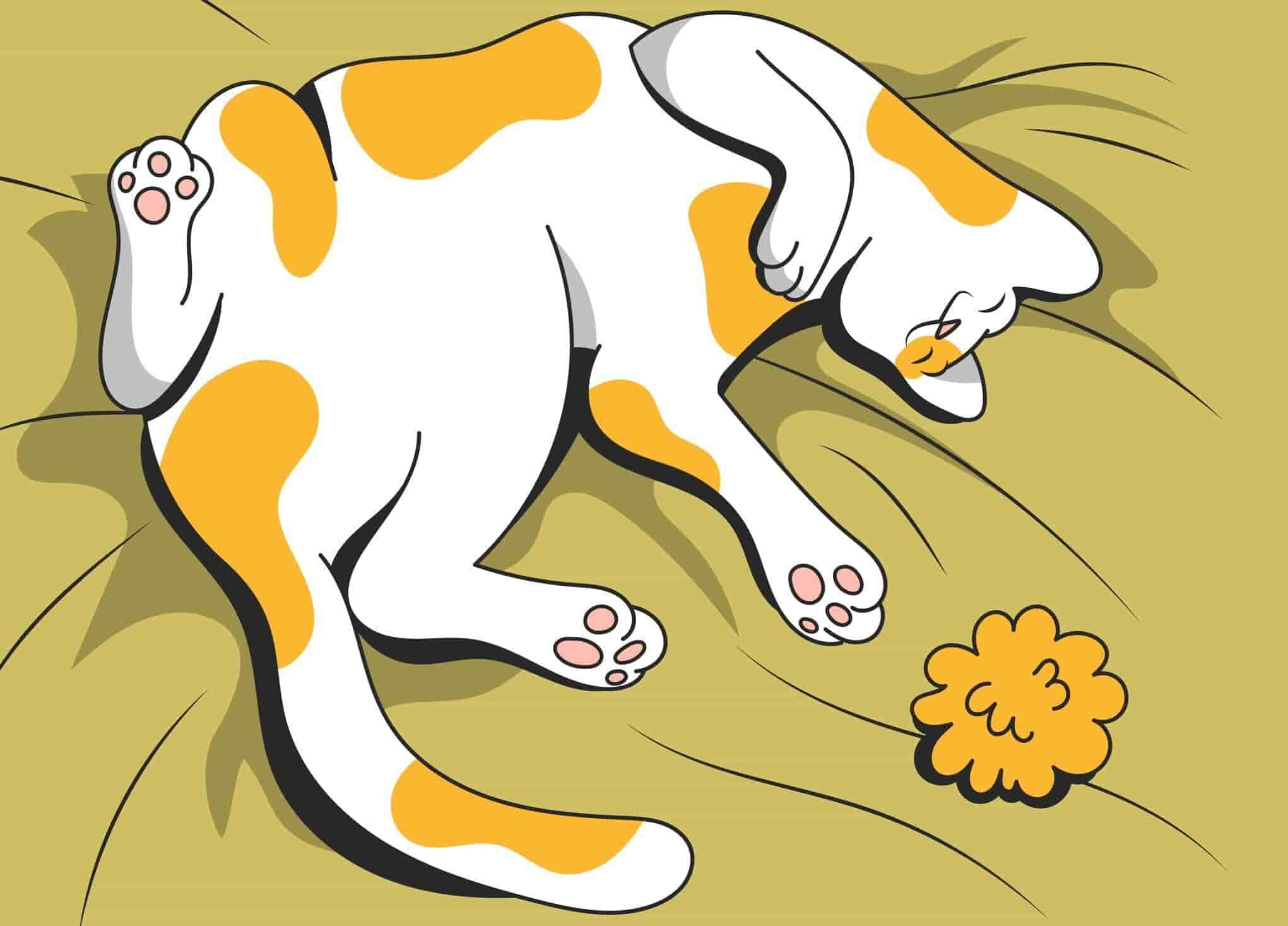According to experts, cats sleep for a whopping 12 to 18 hours a day. They literally spend half to three-quarters of their furry little lives sleeping – and I’m actually jealous.
Cats twitch in their sleep for a whole host of reasons, some of which are cute and adorable. Other reasons, however, can be a warning sign of something more serious.
Let’s dive right in at the deep end.
Stop Googling - Ask a Real Vet
What is Feline Hyperesthesia Syndrome?
Vets and experts can’t seem to agree on what Feline Hyperesthesia Syndrome is, or why it happens. Some believe it is a mental condition and should be classed as an obsessive-compulsive one. Others, however, believe it is more closely related to seizures, therefore classing it as a seizure condition.
The condition appears to have ‘triggers’ in some cats. Feline Hyperesthesia Syndrome triggers can include knocks on doors, doorbells, unknown visitors, certain noises, changes to food or litter, touching sensitive areas of the cat’s body, and others.
Has My Cat Got Feline Hyperesthesia Syndrome?
According to research, Feline Hyperesthesia Syndrome, also known as FHS, is a pretty rare condition that afflicts cats. It is sometimes also known by a couple of other names, too: rippling skin syndrome/disease, or twitch-skin syndrome/disease.
Feline Hyperesthesia Syndrome Symptoms to Watch Out For
FHS will display differently in different cats but usually consists of bizarre periods of intense and erratic activity that usually last for a few seconds or minutes only. These periods are referred to as ‘episodes’ and can happen both when the cat is asleep and awake.
Erratic behavior can include:
- Frantic licking of the legs, tail, and back;
- Furious tail-flicking;
- Running around super-duper fast (usually called the ‘zoomies’);
- Biting around the legs, tail, and back;
- Agitated demeanor;
- Acting seemingly ‘possessed’.
Cats will also sometimes display the following Feline Hyperesthesia Syndrome symptoms:
- Dilated pupils;
- Fast breathing;
- Increased saliva;
- Unusual vocal noises;
- Skin or fur rippling along the length of the cat’s back.
To detect any symptoms of feline hyperesthesia syndrome or any other condition or changes in your cat’s behavior, a pet camera like the Petcube Cam is an all-around useful gadget to have at home. Its features allow you to keep an eye on your cat at all times, so you don’t miss anything out of the ordinary. With access to an online vet feature, you can consult with certified vets without having to set an appointment.
In cases when you need to physically have your cat checked with their veterinarian, the Petcube Cam helps you relay any symptoms that you noticed to help the vet have a more informed diagnosis.
Is There a Feline Hyperesthesia Syndrome Treatment?
In a word: no. There isn’t a single pill, lotion, syrup, patch, potion, collar, or anything else that will cure FHS.
A combination of treatments can help the symptoms of Feline Hyperesthesia Syndrome, however. Treatment types can vary from vet to vet and location to location. Treatment will also be dependent on the cat’s specific symptoms.
Some vets will offer medication designed to combat anxiety, such as Prozac. Others may decide upon anti-inflammatory medications. Medications that are designed to treat seizures are also an option, such as gabapentin or phenobarbital.
Obviously, some medications are more intense than others, so you will need to discuss the potential side effects of each with your vet before deciding on treatment.
What Else Causes Cat Sleep Twitching?
Feline Hyperesthesia Syndrome isn’t the only reason why you’re watching your cat sleep twitching. There are other causes, and some of them are completely benign.
Fleas and other skin conditions can actually cause a cat to twitch during sleep. If the skin becomes irritated, the skin, fur, or limbs/body can move or ripple in a bid to get the itchiness to go away.
Scratching and twitching in their sleep can also be a sign that your cat is suffering from allergies, has problems with fur (such as matting or difficulty in shedding), or has a skin situation going on (such as infections).
Read more: Signs Your Pet Has Allergies
So, Why is My Cat Twitching in Their Sleep?
If your kitty-cat keeps twitching in their sleep, there’s a pretty good chance they might be dreaming. Just like humans do, cats go through sleep cycles, which generally consist of non-REM (rapid eye movement) and REM sleep.
It is when the cat is in a REM sleep cycle that you will likely notice them dreaming and twitching, and this can happen every 25 minutes or so. During this period, the brain is still active even though the body is asleep, and that’s what causes the dreams.
If a cat is asleep and dreaming, you will likely notice:
- Twitching nose, whiskers, and ears;
- Moving paws;
- Mouth moving as though the cat is silent meowing;
- Actual meowing.
If there are no other symptoms, your cat twitching in sleep is likely to be because of a dream.
My Cat is Twitching in Sleep and Won’t Wake Up – What Should I Do?
Before you start to panic, a cat that is REM sleep and dreaming is going to be harder to wake up. At first, your nudges and pokes will likely just feature as part of the dream, so you may find that your furry feline takes a bit longer to rouse. I could probably pick my cat up and take her for a walk without her even realizing it while she’s in that dreaming stage of sleep.
If you cannot wake your cat up at all, no matter what you seem to do, it could be the case that their twitching when asleep is a sign of something more serious, such as seizures.
Should I Wake My Cat Up if He’s Twitching?
Unless you are concerned that something more serious is going on, waking your cat up when they are twitching is probably not a good idea. To start with, if your cat is simply dreaming, waking them up suddenly, out of nowhere, is going to give them a bit of an unpleasant shock.
If you are concerned and do decide to wake your cat, try to do so gently, with strokes and loving words rather than pokes and concerned voices. The last thing you will want to do is agitate or worry your furry friend for absolutely no reason whatsoever.
Is My Cat Twitching in Sleep or Having a Seizure?
If you have tried and failed to wake your cat or kitten from sleep while they’re twitching, it could be the case that they are having a seizure or another medical episode that requires veterinary intervention.
Seizures tend to come with jerkier movements than dream twitches, which tend to be almost missable. Seizures and other medical causes will sometimes come with other symptoms in the lead-up and afterward, although this isn’t always the case.
You should be concerned about your cat twitching when asleep (or at other times) if you also notice the following:
- Jerky movements;
- Stiffening of the muscles and/or limbs;
- Difficulty in waking them up;
- Any foam or fluid around the mouth or nose;
- Changes in eating habits, particularly decreased eating;
- Fatigued/exhausted demeanor.
If you do notice any of the above along with twitching, you should consult a vet about your cat’s health. It might be a good idea to monitor your cat on a Petcube interactive pet camera to get a full picture of how your furry friend is behaving when you’re not around.
Concerned About the Cost of Vet Bills?
You’re certainly not the only one, and that’s why Petcube is proud to offer an excellent value-for-money service that gets you top-notch vet care when you need it the most… even when you don’t have the money in the bank to pay for it.
Whether it’s your cat's full body twitching in sleep, or another pattern of behavior that you have become concerned about, you can get access to up to $3,000 of treatment for your furry friend, and up to five others, for less than $1 per day with the help of Petcube's Emergency Fund.
FAQ
Why Are My Cat’s Ears Twitching When They’re Asleep?
If you have noticed that only your cat’s ears are twitching when they’re sleeping, it might be the case that your cat has an ear infection, a build-up of wax in the ears, or is suffering from ear mites. You should get your cat checked over by a vet.
My Sick Cat is Twitching in Sleep – Should I Worry?
If your cat is sick and has started twitching when they are asleep, it is definitely worth mentioning it to your vet. If you haven’t already spoken to your vet about the condition of your cat’s health, it is time to do so. Twitching and moving could be a sign that your cat’s illness is getting worse or more unpleasant.
Why Are My Kittens Twitching in Sleep?
Kittens will twitch in their sleep for all of the same reasons that adult cats do. It’s usually a result of a very exciting (or scary) dream. If you are at all concerned, however, it is recommended to get the kittens checked by a vet.

Was this article helpful?
Help us make our articles even better









